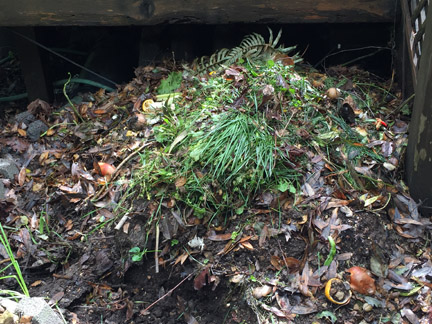
lazycompost.com
Gardening organically since 1968
Organic Debugging
Organic Gardening Simplified
©
Pam Walatka
Organic gardeners do not use dangerous pesticides. You can tell by the label
whether or not a product is dangerous. If it says "DANGER,
harmful or fatal if swallowed. Keep away from children and pets,"
don't buy it! Such products do not belong in an organic garden.
If you are an organic gardener, you can safely garden while your
children play beside you.
How, then, do you protect your garden from pests? There are ways.
- Plant crops that are pest resistant.
Here are some suggestions for bug-resistant planting. But some of these plants are
susceptible to other predators, such as deer. For example, roses are bug-resistant
but are devoured by deer.
| Flowers | Vegetables | Fruits | Herbs |
Roses
Daffodils
Paperwhites
Iris
California Poppy
Valeriana
Sage
Penstamon
Hardenbergia
Viola
Impatiens
Begonia
| Cucumber
Tomato
Sweet Pepper
Corn
Radish
Chard
Pumpkin
| Any fruit
| Any herb
Rosemary
|
Here are some plants to avoid: daisies (use feverfew or coreopsis instead),
tulips (use daffodils and iris instead), Mexican primrose (use ordinary primrose instead),
lettuce (or use methods below), pansies (use violas instead),
- Improve your soil. Healthy plants are more resistant to insects, just as healthy
jungle animals are less likely to be eaten by predators. Healthy plants come from terrific
soil. You can make your soil terrific by adding lots of compost and mulch. Mulch is a layer of
natural material such as leaves that you add to the top of your soil. For example, every
fall I put a six inch layer of oak leaves on top of my rose bed; the leaves gradually break down
and become fluffy soil. The soil is so fluffy now that I can dig in it with my fingers. For more
information on compost, see our Compost Simplified and
Compost F.A.Q..
- Kill! Kill! Kill! Organic gardening has nothing against killing pests.
Joseph Campbell, author of Hero With a Thousand Faces, once told me that death is a natural
part of life. Campbell said that civilized humans need to find a safe outlet for their natural
urge to kill. I enjoy killing snails. If I see a snail, I smash it into oblivion. At night with
a flashlight, or very early in the morning, you can go on snail patrol and wipe out a whole
army. Wear gloves. Pick up each snail and return it to the earth: drop it and smash it into the
ground with your shoe. If you are squeamish about killing, just toss the snails as far away as
you can, instead of killing them.
Old joke: A gardener picks up a snail and throws it far away. Six weeks later the snail is back
and says to the gardener,
"What was that all about?"
- Bait. No, no, not normal "Snail Bait." Use beer. Put some beer in
small containers such as empty tuna cans or
pretty little cups, and place them near your plants. A few snails or small slugs, and
many earwigs will crawl into the cup,
attracted by the beer, and drown. Awww. Leg Up and Gardeners Supply (see side bar) both
sell traps for this. Also, Sluggo makes a snail bait that has been deemed safe for organic
gardens.
- Squish. Some insect such as aphids like to congregate on unopened flower buds,
especially on roses. Cup your
gloved hand over the bud, bring your fingers and thumb together under/around the bud,
and gently swipe upward, killing
all the aphids. Also, if you see an earwig, pinch it dead.
- Wash. Overhead watering will eliminate a mild infestation of aphids or spittle bugs. If you use drip irrigation,
occasionally turn a strong water spray on your plants. Wash houseplants by putting them in the shower.
- Protect you babies. If you are growing plants from seed, start the seeds indoors. When the seedlings have four
leaves each, transplant them into deeper containers, outdoors but up on a table. Plant them in the ground only when they
are big and strong, like plants that come in 4-inch pots.
- Deter. Leg Up (see below at end) sells urine from predators such as mountain lions, to deter deer. I don't know if
it works or not. A friend swears that the sound of a cougar
broadcast periodically in the yard does scare away the deer.
- Fence. For deer, my friends suggest building a tall wire mesh fence around your garden,
and covering it with vines. My brother made a deer fence by stringing fishing line around posts.
Only the posts are visible; you can still see the roses.
- Build a fort. If you are trying to grow something like lettuce that is susceptible
to bug damage, build a
raised bed with sides made out of 1 x 6 inch wooden planks, with a 1 x 3 strip of wood
around the top, providing a little
ledge around the top. Under the ledge, smear some sticky stuff, like tree barrier.
The snails and earwigs cannot cross
the sticky barrier. The lip of the ledge makes it less likely for you to get stuck in the
sticky stuff. While building the raised bed,
attach half-inch wire mesh to the bottom of the planks, to keep out gophers.
I built a fort like this; it works, especially
in combination with beer bait to get the pets that were already there.
- Plant more. This is the classic organic gardening way. Because organic gardeners take better care of the soil
by adding compost and natural soil amendments, organic gardens and farms can sustain more crops per given area. If you
plant more, the pests can eat some and still leave enough for you. I have a neighbor who grows organic lettuce commercially;
he just plants a ton of it, very thickly.
Happy gardening!
To ask questions or make comments, join
Facebook Lazy Compost Club

Bugs, Slugs & Other Thugs: Controlling Garden Pests Organically
How to combat pests organically. Available at amazon.com. This is the book I use. -Pam.
See also my other pages
|
|

LegUp Enterprises offers predator urines to frighten off a variety
of pests without using dangerous poisons. Order from their website:
www.predatorpee.com
Web work and hand-crafted HTML by Sandy Johan and Pam Walatka
2025 Creative Commons Copyright--Ok to share for non-commercial use
email: pam@pamwalatka.com
| |










